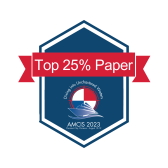Loading...
Paper Type
Complete
Description
In this Wizard-of-Oz experiment, we assess the impact of language style (dominant vs. submissive) on students’ perception of a chatbot in a learning context. 38 probands were involved in this within-subject experiment while learning about Digital Literacy in a guided text-based conversation via Slack, in which they supposedly interacted with a chatbot. We quantitatively measured constructs in a follow-up survey and discussed implications with the probands and 14 other students from a bachelor’s course on digital transformation. Results show that the dominant language style significantly negatively affected learners’ enjoyment during the interaction, but did not reveal a significant influence on perceived competence, empathy, identification, trust, or usefulness between the two contrasted language styles. Our qualitative results indicate that language style preference depends on learning context, interaction time, and learner personality. We reflect on future research needed to build upon these initial findings.
Paper Number
1119
Recommended Citation
Schlimbach, Ricarda; Lapychak, Andriyan; and Robra-Bissantz, Susanne, "Exploring the Perception of a Chatbot's Language Style in a Learning Situation" (2023). AMCIS 2023 Proceedings. 2.
https://aisel.aisnet.org/amcis2023/sig_ed/sig_ed/2
Exploring the Perception of a Chatbot's Language Style in a Learning Situation
In this Wizard-of-Oz experiment, we assess the impact of language style (dominant vs. submissive) on students’ perception of a chatbot in a learning context. 38 probands were involved in this within-subject experiment while learning about Digital Literacy in a guided text-based conversation via Slack, in which they supposedly interacted with a chatbot. We quantitatively measured constructs in a follow-up survey and discussed implications with the probands and 14 other students from a bachelor’s course on digital transformation. Results show that the dominant language style significantly negatively affected learners’ enjoyment during the interaction, but did not reveal a significant influence on perceived competence, empathy, identification, trust, or usefulness between the two contrasted language styles. Our qualitative results indicate that language style preference depends on learning context, interaction time, and learner personality. We reflect on future research needed to build upon these initial findings.
When commenting on articles, please be friendly, welcoming, respectful and abide by the AIS eLibrary Discussion Thread Code of Conduct posted here.




Comments
SIG ED